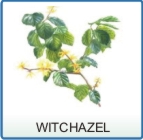Witch Hazel
Witch Hazel
Hamamelis virginiana
Products Containing Witch Hazel
Properties
Astringent, Anti-inflammatory, Soothes, Heals
Primary Uses
Skin conditions including: Hemorrhoids, Canker Sores, Cold Sores, Gum Inflammation, Minor Wounds, Varicose Veins, Diarrhea
The bark and leaves of the witch hazel plant are widely used as medicinal treatments and are widely marketed for direct application to the skin to relieve pain, stop bleeding, control itching, reduce symptoms of eczema, and treat muscle aches. Capsules, ointments, and suppositories containing witch hazel are used for treatment of hemorrhoids. Extracts of the bark and leaf are used in Europe to treat diarrhea, inflammation of the gums, canker sores, and varicose veins.**
Dosage
Witch hazel preparations should be used according to label instructions.
Safety Issues
Witch hazel appears to be a relatively safe substance. When applied to the skin, it may cause allergic reactions. Witch hazel contains tannins, which can upset the stomach. Safety in pregnant or nursing women, young children, or people with severe liver or kidney disease is not established.
References
1. Swoboda M, Meurer J. Treatment of atopic dermatitis with hamamelis ointment. Br J Phytother. 1991;2:128–132.
2. Korting HC, Schafer-Korting M, Hart H, et al. Anti-inflammatory activity of hamamelis distillate applied topically to the skin. Eur J Clin Pharmacol. 1993;44:315–8.
3. Duwiejua M, Zeitlin IJ, Waterman PG, et al. Anti-inflammatory activity of Polygonum bistorta, Guaiacumofficinale and Hamamelis virginiana in rats. J Pharm Pharmacol. 1994;46:286–290.
4. Hughes-Formella BJ, Bohnsack K, Rippke F, et al. Anti-inflammatory effect of hamamelis lotion in a UVB erythema test. Dermatology. 1998;196:316–322.
5. Bernard P, Balansard P, Balansard G, et al. Venitonic pharmacodynamic value of galenic preparations with a base of hamamelis leaves [in French]. J Pharm Belg. 1972;27:505–512.

